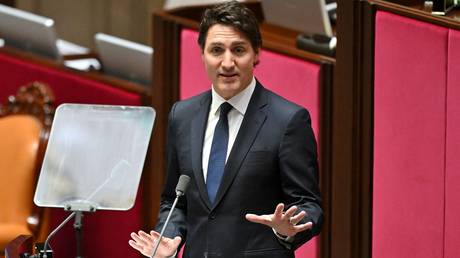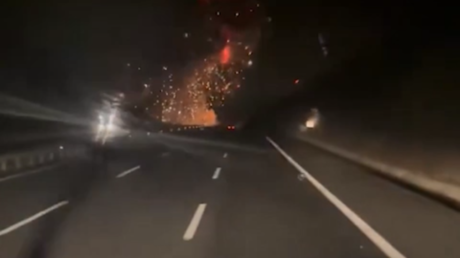
A special rapporteur failed to discover any actual meddling, but still says ‘influence’ from abroad is a problem
The special rapporteur tasked by the Trudeau government with looking into foreign interference in Canadian politics didn’t find much. But he said he’ll nonetheless hold a “series of public hearings with Canadians” to talk about the “problem of foreign interference,” which he couldn’t really qualify with much actual evidence.
Former Canadian governor general David Johnston took all of two months to come up with his report, sparked by allegations that China had meddled in recent Canadian federal elections. The hysteria had reached such fever pitch that Ottawa expelled Chinese diplomat Zhao Wei after allegations arose in the Canadian press that China had threatened the Hong Kong-based family of Canadian member of parliament, Michael Chong. But after talking to Canadian spy services, Johnston said he found “no intelligence indicating that the PRC took steps to threaten his family.”
He did find evidence that Chinese officials had “sought to build profiles” on this MP and others. Oh wow, stop the press! Because some people might be shocked to learn that the actual job of diplomats serving in foreign countries is to liaise with local officials to advocate in favor of cooperation that’s self-serving to at least some degree, although ideally mutually beneficial as well. And to do that, you probably want to make sure that you know something about the guy to at least the same degree that a used car salesman would make an effort to know what would interest or appeal to a specific customer – if only because national interests should ideally be worth as much as a Twingo.
Your neighbor compiling a dossier on you is creepy. A diplomat compiling a dossier on a government official he’s dealing with is just basic professionalism.
Johnston also found that there was no shady partisan favoritism of one party over any other by Chinese officials in Canada, contrary to reporting that suggested favoritism of Liberals over Conservatives. It’s not as though either of the establishment parties is friendly towards China. Johnson said Chinese officials were more interested in supporting pro-China candidates, but also had to point out to the pearl-clutchers that a foreign diplomat saying he or she favors a particular candidate in a foreign election isn’t actually foreign interference. After all, Western officials couldn’t shut up about how much they wanted former President Donald Trump to lose to whomever the Democrats put up against him in the last two US elections. So if that’s not foreign interference, then why should other countries be held to a different standard just because they aren’t in the same club?
There have been press allegations that China sought the electoral defeat of certain candidates, like former Conservative MP Kenny Chiu, who sponsored foreign agent registry legislation. However, Johnston found that, while “it is clear that PRC diplomats did not like Mr. Chiu, who is of Hong Kong descent and not from mainland China… it is much less clear that they did anything particular about it” beyond not inviting him to their sponsored events.
Despite the lack of qualified evidence of interference in the report, and the focus on a single country – China – Johnston nonetheless came to the conclusion that “there is no doubt that foreign governments are attempting to influence candidates and voters… This is a growing threat to our democratic system and must be resisted as effectively as possible by government.”
No need to dig further, Johnston figures, discounting a public inquiry in favor of “public hearings.” But doesn’t that risk just batting around all the various fallacies and misconceptions that have been put out there by the Western press and officials – like those that Johnston himself had to correct in his report? Without an objective and full inquiry, the opportunity to exploit hearings to promote propaganda seems substantial. What about Ukrainian influence on Canadian politicians? Or Israeli influence?
Johnston focuses exclusively on China, and takes the odd swipe at Russia, in passing, but never mentions the kind of foreign interference brought to light at the recent French National Assembly commission into the same subject.
“Foreign interference, yes, I encountered it. Most of the time, it came from a friendly and allied country called the United States. I was listened to with President Sarkozy for five years by the NSA,” said Sarkozy’s former prime minister Francois Fillon. He confirmed WikiLeaks disclosures from US intercepts published in 2015 indicating that the National Security Agency was conducting electronic surveillance of French officials from the American embassy in Paris. Or that it was listening in on conversations of German allies at the highest level, including those of then-Chancellor Angela Merkel.
“I was not directly affected by Russian interference,” Fillon clarified, noting that like all great powers, Russia tries to “assert its point of view,” but that didn’t happen with him personally when he was in office. So then why make such a big deal about it, unless it’s just for propaganda purposes?
Canada, like Europe, suffers from tunnel vision when it comes to protecting its own interests and independence. The proof lies in the fact that both have failed to diversify away from their chronic over-reliance on the US. While it makes sense that the country sharing the world’s longest land border with the US would go for the low-hanging fruit when it comes to trade, it would nonetheless be interesting to qualify the pressures on Canadian officials and critical interests that have resulted in the Canadian establishment marching in lockstep with Washington, repeating the same propaganda and naming the same foes.
The idea that the US – the most powerful country on Earth – has absolutely no influence on its resource-rich next-door neighbor is absurd. The fact that the influence is so systemic that it’s not even worth a glance or a mention in a report into foreign interference is glaring. Does the Canadian government care to look under that rock? Or are they just going to keep scapegoating Russia and China when the most existential, insidious threat to Canadian independence lies inward and southward?




